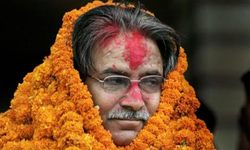by Damakant Jayshi
Kathmandu, February 9, 2014
Reconciling their differences over power-sharing that was beginning to deepen the political impasse, the Nepali Congress and the CPN-UML signed a seven-point agreement on Sunday paving the way for Sushil Koirala as the new Prime Minister.
Soon after, NC President Koirala filed his nomination in the Parliament for Monday’s election and thanked the UML for its support. “The responsibility to draft a democratic Constitution is on the shoulders of the Nepali Congress and CPN-UML,” Mr. Koirala told media persons after filing his nomination.
“We will prepare the draft of the Constitution in six months and promulgate in a year.”
With this expression of support, Mr. Koirala is assured of getting elected unopposed. He would still need to enter the election process as per the Interim Constitution, since the election is being held under majority provision.
NC vice-president Ram Chandra Paudel is set to propose his name and the CPN-UML’s newly elected Parliamentary Party leader K.P. Oli would second the proposal.
As per the agreement between the two parties, there would be no election for the post of President and Vice-President for now, a demand that UML had insisted upon until the last moment.
The election for these two posts — and for the Prime Minister and Speaker of the House — would be held after the Constitution is made public (in a year) but before it comes into effect.
However, the NC agreed to the UML’s suggestion of having the President and the Vice-President endorsed by the Parliament. The parties agreed to amend the Interim Constitution incorporating this provision.
They also agreed to draft the Constitution according to the spirit of all the agreements reached in the past — right from the 12-point agreement reached in New Delhi in 2005, the Comprehensive Peace Agreement, the Interim Constitution and the mandate expressed by the people in the November election.
As a sop to Unified CPN (Maoist) and Madhesi parties, the deal says it would own the agreements reached by the last Constituent Assembly, a move likely to be challenged by the fourth largest party, the RPP (Nepal). The pro-monarchy party has opposed any adoption of pacts of the last CA, arguing that it would be a violation of the mandate of the recent election.
The NC also agreed to support the UML nominee as chairman of the Constituent Assembly (who will also function as Speaker of the Legislature-Parliament).
This point was added to an earlier draft agreement.
Within a week of government formation, the Cabinet would announce a common minimum programme and a code of conduct for cabinet members.
The deal was signed after the CPN-UML decided on Sunday to support an NC-led government.
The highest decision-making body of the CPN-UML, the standing committee, took the decision to support Mr. Koirala.
“The UML has decided to support an NC-led government,” CPN-UML Chairman Jhala Nath Khanal told mediapersons after the meeting of the party’s Standing Committee.
Keywords: Nepali Congress, Sushil Koirala, Nepal politics, Jhala Nath Khanal
RELATED NEWS
Nepal Prime Minister poll set for February 10February 5, 2014
Nepal leaders promise timely Constitution January 27, 2014


Recent Comments